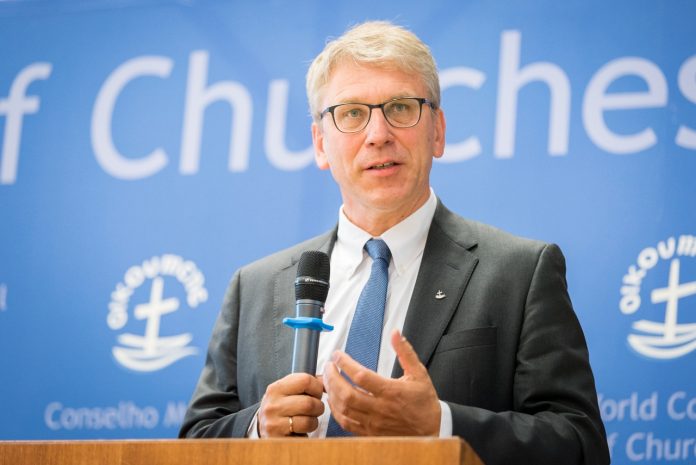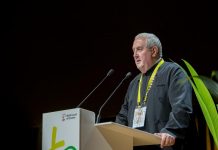World Council of Churches (WCC) general secretary Rev. Dr Olav Fykse Tveit shared his reflections in several settings at the 25th Pentecostal World Conference, held in Calgary, Canada this week. The theme of the gathering was “Spirit Now.”
During a workshop entitled “Pentecostals and Christian Unity: Bilateral and Multilateral Conversations”, held on 29 August, Tveit served as a panelist, and expressed gratitude to the leadership of the Pentecostal World Conference for offering workshops on Christian unity.
“The call to Christian unity is for all disciples of Christ and all churches or families of churches that confess Lord Jesus Christ as God and Saviour,” said Tveit. “The ecumenical dialogues are both a dialogue of truth and a dialogue of love.”
Relationships are at the heart of intra-Christian conversations, Tveit reflected. “This is more than a diplomatic truism,” he said. “The basis of our faith is God’s relationship to the world through Jesus Christ and his sanctifying presence through the Holy Spirit.”
Tveit noted that history reminds us of our differences. “Our history with one another has often been marked by prejudice, divisions, and even violence,” he said and, in turn, dialogue helps us to recall what we share in common. “Over the past decades the churches have grown together in faith through a myriad of conversations that have lead to common affirmations and shared witness.”
Tied through history
Both the WCC and the Pentecostal World Fellowship were founded in the late 1940s after World War II.
“The first step in our relationship was to discover one another,” Tveit said. “The second step in our relationship was to create a platform for consultation.”
In 2000, the Joint Consultative Group between Pentecostals and the WCC was established. It is in its third round of consultation and will report to the WCC Assembly in 2021.
“The third step in our relationship has been to establish a platform for cooperation, namely the Global Christian Forum, where the World Council of Churches, the Pentecostal World Fellowship, the World Evangelical Alliance and the Roman Catholic Church, share responsibility for engaging the leaders of our churches in conversations of faith and witness.”
At a dinner with ecumenical leaders, Tveit explored the reconciling power of love. “The Holy Spirit is the giver of life – and life together,” said Tveit. “We all need, in times like these, that Christ’s love can reconcile and unite us as churches and as humanity.”
The Pentecostal movement and the ecumenical movement have something in common, Tveit said: the search for renewal of the churches, breaking down barriers and search for unity in witness and service.
“The Global Christian Forum has made us all able to develop new relationships between representatives from different streams of world Christianity, and I have seen how that is particularly true in our mutual relationships,” he said. “We have experienced that Christ’s love has moved us closer to one another, and enabled us to see our common calling in many ways and with many partners.”
He shared with those gathered the theme of the WCC Assembly to be held in Karlsruhe, Germany in 2021: “The love of Christ moves the world to reconciliation and unity.”
“I see the connection between your theme and ours. Spirit now. Love now,” Tveit reflected. “Love is a deep and powerful attitude rooted in compassion and true human relationships, expressed through mutual belonging, service and sacrifice.”
WCC, oikoumene.org















